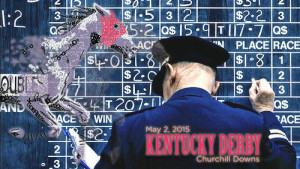
Category Archives: Bottom Featured


Lyons Column: The Games of 2015 and 2024
The Games of 2015 and 2024
By Terry Lyons, @TheDailyPayoff Contributing columnist
@terrylyons
BOSTON – A dangerous game with the highest stakes in the entire sports world is playing out this summer, and about a week ago, the United States Olympic Committee doubled down on its weakening hand. The USOC is gambling with the battered reputation of the United States of America in the international sports community, and the organization’s wager is a “Come To Boston in 2024” bet that has a doubting New England community yelling “CRAPS!”
On January 8th of this year, the USOC surprised the elite followers of the Lord of the Rings with the announcement that Boston was selected over Washington DC, San Francisco and Los Angeles as the USA’s choice to put forth in the high stakes poker game of landing the rights to host a future Summer Olympic Games, targeting the next available Olympiad to be held way in the distant future of 2024.
With the fact that the Summer Games have not been held in North America since the ill-fated, domestic terrorist bomb-laden Atlanta Olympics of 1996, the Pundits of the Rings all believed the United States entry had a better-than-average chance at landing the ’24 Games. Since ’96, the better part of the universe has had its hands in the Olympic cookie-jar, including Sydney (2000), Athens (2004), Beijing (2008), London (2012) and all-too-soon-to-be Rio (2016). After that, Asia will host the XXXII Olympiad, with the 2020 events in Tokyo.
That left Olympiad #33 up for grabs, and what better way could there possibly be to celebrate the 40th anniversary of the great Larry Bird’s dual NBA & NBA Finals MVP season than the Summer Games right behind the Fourth of July on the Esplanade?
So the USOC acted on this notion back in January, and all the local Boston politicians and civic leaders jumped right on the bandwagon, figuring there would be much rejoicing. All was fine and wonderful in Beantown, for about as long as it took the New England weather to change.
The cruel winter of 2015 dumped 108.6 inches of snow atop the golden dome of the State House, the worst winter snowfall since 1872, some 24 years before the ancient Olympic Games of 1896. What the politicians and USOC members did not count on during that snowy winter were the two things every Bostonian can claim as his or her own – crankiness and complaining.
Bostonians, and New Englanders, in general, love to complain. They complain about the weather, the weather forecasters, the politicians, the sports teams, and their coaches. Even when the coaches deliver championships, the next season the fans complain. You can ask Red Sox manager John Farrell or Bruins coach Claude Julien, and they’ll tell you, if they still have jobs next week. And, that’s just sports!
When it comes to REAL complaining, Bostonians have three favorite topics: the Big Dig, the traffic, and the transit system, known to all as the T, probably since its formation in 1897, only a year after the inaugural and ancient Olympics in Greece.
Now put this perfect storm together, and you won’t need a PhD in Mathematics from MIT to frame the equation:
IOC + USOC + 2015 + 108.6 (snow) + Big Dig – (new Governor + new Mayor) = Boston – 2024
What is the answer to that problem?
A resounding no.
Faster than a politician can flip-flop, the grand plans of Boston 2024 were called into question, and the pronouncement of Boston being the USOC’s city of choice as fact was denounced by civic groups, claiming the 2024 Games would cost taxpayers hundreds of millions.
While the snow fell, Bostonians did what they do best and started to complain to their elected officials to the point where all hell broke loose, and the original head of the Boston Olympic organizing group, prominent construction magnate John Fish, had to step down and was replaced by Steve Pagliuca, known to most as managing partner of Bain Capital investment group and co-owner of the Boston Celtics.
In recent weeks, Pagliuca has done what any newfound co-chair of a committee would do. He called for a “players only” team meeting, re-shaped the Boston 2024 bid specs, and launched version 2.0 in order to appease the inquiring minds of “No Boston 2024” and a public still complaining about the Big Dig, the snow (and the resulting parking and traffic woes), and an ancient, failing transit system.
One thing is for sure: in the world of politics, investments, public opinion, and even sports, team meetings, re-launches, and versions 2.0 are not good, although Pagliuca has assured all who will listen that the premise of Boston 2024 will not come at the cost of taxpayers of the Commonwealth and the Summer Games will actually fuel a much-needed rebuilding of two Boston neighborhoods while the city works to finance its aging and decrepit infrastructure.
To that point, Pagliuca and Boston 2024 are right. The failing “T” and the aging roads are not going to fix themselves, and by 2024, they will be nearly a decade older.
So the question remains – Should the USOC put forth a bid to the world for Boston to host the 2024 Olympics?
With world-class cities like Paris and Rome amongst the competing cities, a successful Boston bid is a long-shot, at best. Even Hamburg and Budapest might be more viable candidates to the IOC. But the influence of the North American audience (aka NBC/Comcast television money) might be enough to influence the IOC hierarchy to vote for the USA candidate city, either in 2024 or no later than 2028.
The people of Boston need to recognize the fact that the old-fashioned way of “complaining and doing nothing” is only a mantra for the GOP, not a city in dire need of modernization.
While the bid-specs detail the use of existing facilities and champion a new approach, tagged as “Olympic Agenda 2020” by the IOC, seeking to cut down on the growing excesses of prior Olympiads, the secret sauce for Boston 2024 is to seek new and better sources of revenue generation.
One idea, totally lost in the shuffle of all noise generated this spring, is Boston 2024’s original bid idea to “farm out” some of the events – such as the preliminary round of basketball. In such a plan, two groups of six teams could play to large audiences in cities such as New York or Chicago before coming to Boston for the medal round to be played after artistic gymnastics folds up its tent and TD Garden reverts back to the parquet floor.
Another idea – ripe for the times – is to factor in potential revenue or licensing from all-out sports gambling on certain events of the Games. Properly administered, global wagering from authorized sports books and even daily fantasy sports could add tens of millions to the Boston 2024 coffers, and that would be just for the sponsorship or official licensing rights to the likes of William Hill or Betfair.
Affiliate fees and a portion of the take might net enough cash to appease the Boston 2024 naysayers while paving the road for additional fees to further ensure possible cost over-runs. The Mass Lottery might like it enough to begin the program as early as the Summer of 2016, when wagering or a DFS lottery on the Red Sox, Celtics, Bruins and Patriots could mint millions, just as the Rio Games are planning to wager their Olympic reputations on the likes of win, place, and show bets on gold, silver and bronze.
Let the Games begin.
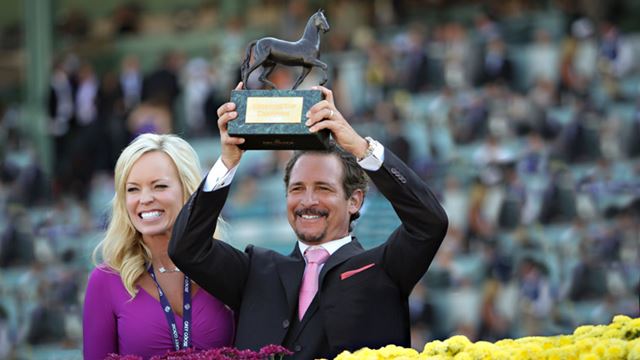
Jim Rome To Deliver Keynote at Thoroughbred Owner Conference
By @TheDailyPayoff
Jim Rome, a prominent Thoroughbred owner and the host of “The Jim Rome Show” on CBS Sports Radio and “Jim Rome On Showtime,” will deliver the keynote address when OwnerView, The Jockey Club, and the Thoroughbred Owners and Breeders Association host the second Thoroughbred Owner Conference in Hallandale Beach, Fla., in January 2016.
The conference will be held at Gulfstream Park from January 11 – 14 during the week leading up to the 45th Annual Eclipse Awards Dinner, which is scheduled for Saturday, January 16, 2016.
OwnerView is a joint effort spearheaded by The Jockey Club and the Thoroughbred Owners and Breeders Association to encourage ownership of Thoroughbreds and provide accurate information on trainers, public racing syndicates, the process of purchasing and owning a Thoroughbred, racehorse retirement, and owner licensing.
The Jockey Club explained that Rome has experienced significant success campaigning horses under the name of Jungle Racing LLC. Mizdirection was a two-time Breeders’ Cup Turf Sprint champion and earned more than $1.7 million. Shared Belief, the Eclipse Award-winning champion 2-year-old, has won five Grade I events and 10 of 12 races overall, including the Santa Anita Handicap, and is currently ranked behind only Triple Crown winner American Pharoah in the weekly NTRA National Thoroughbred Poll.
“We are honored to host a conference that will build on the success of the inaugural event last year,” said Mike Rogers, president of The Stronach Group’s Racing and Gaming Division. “This is an event that is both educational and enjoyable for new and long-time owners, and we are proud to host it for the first time in the days leading up to the Eclipse Award dinner.”
Gary Player, a legend in the golfing world and a long-time owner, breeder and advocate of Thoroughbred aftercare, delivered the keynote address at last year’s conference.
Conference details, including the schedule of events, online registration, host hotel information, other tourism tips, are available at ownerview.com.
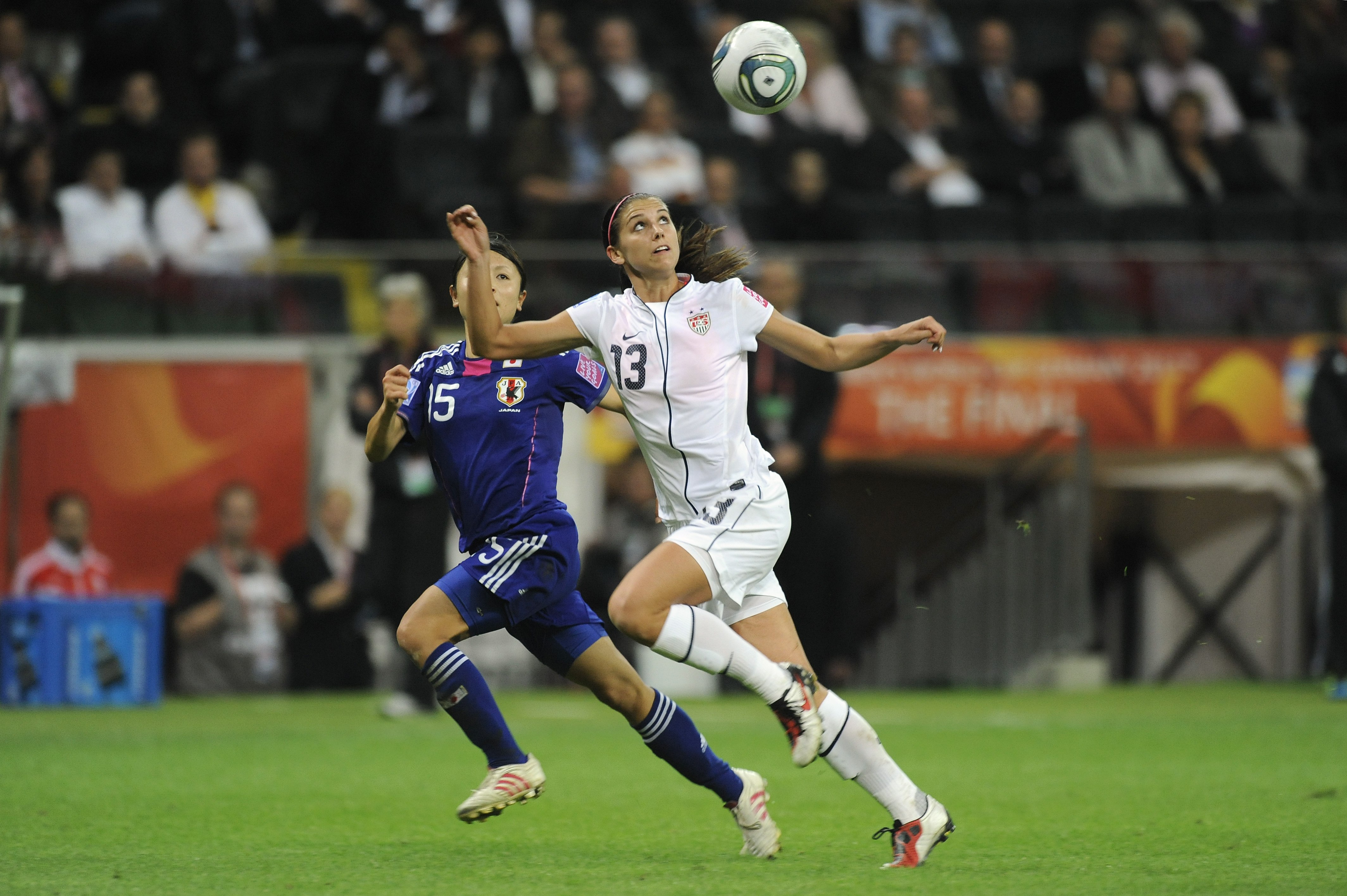
Pay Fantasy Scores With Women’s World Cup
Pay Fantasy Scores With Women’s World Cup
The past few days there has been a great deal of speculation about what the success of the U.S. Women’s National Team can mean to the business side of women’s sports. More recognition in the mainstream can bring its perks, and although the stars of this women’s program are probably the most leveraged of any team of women’s athletes in terms of brand exposure, there is still a huge opportunity void that still can be exploited.
What about fantasy sports? Last week at the Fantasy Sports Trade Association Summer Convention, research showed that engagement by women in daily fantasy was the fastest growing demo, an area which is still small by comparison to men but it is growing by the day. And although Fan Duel CEO Nigel Eccles said recently at the Cynopsis Sports Conference that their company’s growth area for the next five years was going to be primarily focused on the NBA and the NFL, DraftKings and some other smaller companies have moved to find other niches of success in sports like fantasy golf and NASCAR and even soccer.
The company which has made the biggest investment in daily fantasy soccer is Mondogoal. Based in Isle of Man and Boston, CEO Shergul Arshad has built their company working with some of the bigger soccer clubs in the world this past year, and recently cast the dice by launching the first, and only, daily fantasy game around a women’s team sport, tied to the ongoing FIFA Women’s World Cup.
Has the game been a success? We checked in with Mondogoal to see what the engagement has been like as we head toward this weekend’s final in Vancouver.
While they would not give hard numbers, Mondogoal reported very strong growth, which has included thus far:
Opening week of the Women’s World Cup saw 12% more activity (12% more entries from users) than the largest weekend of activity for the English Premier League.
In terms of new engaged users, thousands have become first time users of Mondogoal as a result of the WWC and Co-Ed contests.
Number of Female users has tripled over the amount of engaged users for pay fantasy play for clubs this past winter like Manchester City, AS Roma and FC Barcelona.
Despite the time difference (many games kicking off late at night/after midnight) they have seen thousands of entries in the United Kingdom as well, in part to the England National Team’s deep run into the tournament
More players becoming household names/well known. Early in the tournament Abby Wambach/Alex Morgan were among the most selected US fantasy players on Mondogoal, based on name recognition alone. Carli Lloyd, Julie Johnston and Megan Rapinoe have since passed them based on fans watching the games and recognition of their play during the tournament.
In addition, Mondogoal went co-ed and is expecting a similar rise in their $10,000 Summer Showdown contest again as well. It will feature the following matches, with 200 Users will enter and select top male players (Lionel Messi, Sergio Aguero, Alexis Sanchez) alongside top Female Players and compete for $10,000 in prizes.
Chile v. Argentina (Men’s Copa America Final)
Germany v. (loser of Japan/England) – WWC Third Place Game
USA v. (winner of Japan/England) – WWC Final
What does this activity mean? Will we be seeing more WNBA, Olympic gymnastics and WTA and LPGA Fantasy going forward? Hard to say given the uniqueness of WWC, but safe to say that daily fantasy for select events, men or women, continues to have staying power and consumer engagement opportunities that are on the rise, and that’s good news for everyone, from fans to brands to broadcasters to athletes. The more engagement, the bigger the pie, regardless of gender.
Mobile Making Fantasy A Reality For More Players
Mobile Making Fantasy A Reality For More Players
At last week’s Fantasy Sports Trade Association Summer Conference in New York, a crowd of several hundred, most on laptops, listened intently to sports and fantasy business leaders talk about the upward growth and engagement of consumers in and around all things fantasy, especially the fascination with daily pay fantasy, a part of the field dominated by the two biggest players, Fan Duel and DraftKings.
The data, provided by Jason Allsopp of the research firm Ipsos, was amazingly positive news for those in the room; More people are playing fantasy than ever before, with 51.6 million people age 12 and over in the United States engaged, 20 percent of the population, up from 14 percent in 2014.
More importantly perhaps, women are playing fantasy sports in much larger numbers, with 33 percent of players now female, a big jump in the last three years. The biggest jump overall is in DFS play, where seventeen percent of all fantasy players play DFS exclusively, up from 8 percent in 2013, with spending up to $257 annually for a DFS player who was only spending $15 in 2012.
However one of the most important factors that came out of the Ipsos study was mobile engagement. Fantasy players are becoming increasingly mobile with just 44 percent of players using a desktop or laptop computer is their primary device for fantasy sports. That was down from 68 percent in 2013. The combination of an avid mobile user and a more engaged younger audience is not really surprising given where consumers are trending these days, and it’s even less surprising when you look at a global audience that could engage in fantasy, but what is surprising is the lack of mobile adoption by fantasy businesses at this stage.
The model of DFS as it stands now for the larger players are based around salary cap games. While apps do provide a mobile option, setting full lineups on a smaller device given the amount of research needed is both tricky and cumbersome. Since retention and acquisition for the bigger sites like FanDuel and Draft Kings is so vital for growth (reportedly neither are profitable yet despite the millions invested in the brands by everyone from venture capital to the NBA and MLB), a tough mobile option can be a turn-off for the younger mobile savvy first adopter. Both Fan Duel and DraftKings have been bullish in tackling the mobile experience and are making strides with their apps so that they are as user friendly as possible, but does more need to be done?
If mobile is key, can companies pivot to simpler, non-salary cap mobile first game that are springing up by the dozens? And if simpler and mobile is where the DFS industry needs to go, can there be a micro-option built in that will bring large revenue and more players for simpler games?
“We have seen that the best mobile experiences; Instagram, SnapChat, are simple to engage with and easy to navigate for everyone,” said Tom Richardson, Columbia University professor, veteran sports marketer and one of the most engaged professionals in sports in the mobile field. “While companies like FanDuel and Draft Kings are doing a good job with their experience for consumers, the bottom line is consumers will always expect not just a good, but an easy and simple mobile experience and fantasy businesses need to think that way first to grow, especially new businesses trying to find a niche in the space. Without a prime mobile experience first, you will have big challenges acquiring and retaining consumers no matter how much money you raise or how robust your offering is.”
We have seen freemium games outside of sports; Angry Birds, Candy Crush, draw big numbers of engagement because of simplicity. That model lasts for shorter periods of times, and in the case of Rovio and Angry Birds, has led to issues when the company tried a new level of engagement.
With a host of new players coming into the marketplace, from big media companies like Yahoo to many smaller players looking for not just a piece of the current marketshare but for a way to actually increase the size of the market by engaging milennials, women and casual sports consumers, is simpler and mobile the next step?
It would seem like the smartest bet.
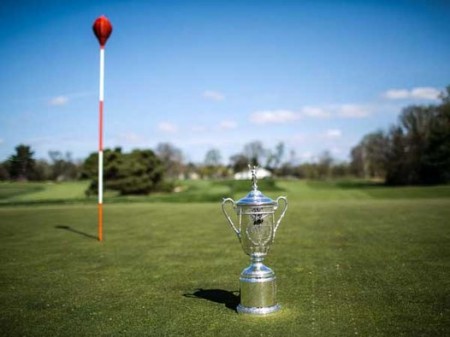
TDP EXCLUSIVE: Three Putt at US Open Brings Fantasy Fortune to First Time Draft Kings Player
THREE PUTT AT US OPEN BRINGS FANTASY FORTUNE to FIRST TIME DRAFT KINGS PLAYER
By Terry Lyons, Contributing Columnist, The Daily Payoff
@terrylyons
A Father’s Day summer evening turned into night and golf fans around the world surely shook their heads in disbelief when the 17th and 18th holes at Chambers Bay brought about the strangest of finishes to the 115th United States Open golf championship. The four-day tournament was near its conclusion and the prime time US television audience stayed glued to their High-Def TV sets which delivered the grimaces of PGA Tour pros Jordan Spieth and Dustin Johnson into the living rooms of many casual sports fans, some longing for a Game 7 of the completed NBA or NHL seasons but left with nothing else to watch but the major golf championship.
What those primetime Fox Sports viewers couldn’t see or feel as the sun set near the Puget Sound were the heart palpitations pulsing through Carl Bassewitz, a veteran sports industry good-guy who was playing Draft Kings PGA Millionaire-maker daily fantasy game for the very first time. Bassewitz, watching on his TV, a half continent away from the action, double and triple-checked the scores of his six player fantasy team that he selected. His lineup featured Spieth but not Johnson, and also included, Louis Oosthuizen (T-2), Kevin Kisner (T-12), Tony Finau and Patrick Reed (T-14) and Jason Dufner (T-18).
That “fantasy team” combination delivered Bassewitz to the dream world of all fantasy sports players, as he turned a single $20 entry fee into a cool $1 Million dollar prize. In doing so, Bassewitz outlasted 143,000 entrants who ponied-up the $20 fee with hopes of a $1 million when they chose their lineups for six golfers, staying under a $50,000 cap, as per usual in the Draft Kings golf game. One such player, the second place finisher who is only known as “Headchopper” who is known as a professional in the fantasy sports world, needed Johnson to finish ahead of Spieth. But Johnson’s improbable three-putt on the 72nd hole of the tournament gave the U.S. Open title and its $1.8 million first place purse to Spieth, while delivering a cool mil to Bassewitz and a not-so-paltry $877,144 runner-up prize to both Johnson and Oosthuizen.
When reality set in, Bassewitz realized he’d made more money than the U.S. Open runner-ups!
“I had heard a lot about the Daily Fantasy sports craze and figured I’d give it a try,” said Bassewitz to The Daily Payoff in an exclusive interview, his first since being officially notified by Draft Kings that he was the lone prize winner. “I wanted to know exactly how it worked, so I entered a team.
“Spieth was my first choice, but I’d been following the PGA Tour pretty closely, just as a fan, and I liked the way Kisner was playing. Reed is one of my personal favorites and fellow Texan and Finau had been playing great of late and I’d followed him since seeing him play on the Big Break on Golf Channel. To win at these games, you definitely need some skill and some insight into how the players can compete on any particular golf course. I’ve always been a fan of Duff (Jason Dufner) and I really thought he was due and, overall, I thought the guys I picked could hold up under the pressure and the conditions at Chambers Bay.
“Oosthuizen was the key pick, for me, and I’ve followed him since the 2013 Masters which I was fortunate enough to actually attend.”
Bassewitz and one of his friends each were watching from home on Saturday, during the third round of the tournament when Finau carded a 74 and Reed wrote down a 76 in his score pad, making the longtime sports industry executive think his entry was pretty much cooked. But just as Reed and Finau fell on the leaderboard, Oosthuizen climbed up with consecutive 66’s on Friday and Saturday, giving the fantasy entry new hope.
“I went out to get some lunch and my Draft Kings app told me I’d dropped down to something like 750th place. I thought it was over. Then on Sunday, my friend started charting the other entries online and he texted me to say, ‘I think you have a chance at a Top 10, maybe a Top 3!”
The roller-coaster ride struck bottom for Bassewitz when he watched Spieth double-bogey the 17th hole Par 3 at Chambers Bay, the ramifications of his three-putt from within 40-feet just sending pain through Bassewitz as he watched helplessly and figuring Spieth and Johnson would end in a tie to force an 18-hole playoff on Monday.
In order to win the tournament and a $1M, Bassewitz needed Dustin Johnson to miss, not just once but twice. If there was a playoff, he would have lost. The putt was essentially for $900,000 as Draft Kings’ second place finish was worth $100,000
“When Dustin Johnson missed that last putt, I was stunned and in shock and didn’t think it was real,” said Bassewitz. “My phone was blowing up with my friends from around the country. It didn’t sink in until I was contacted by Draft Kings about 30 minutes after the US Open trophy presentation to Spieth.
“This is something my father would have loved as he taught me a lot about the game when I was growing up. This is the second best Father’s Day I’ve ever had,” said Bassewitz, referring to best day, when his son, a recent college graduate, was born. “Think about it, on June 11th, I entered this fantasy tournament with one $20 team and now I’m a millionaire.”
Yes, a good guy from within the sports industry and a first-time daily fantasy player is now a millionaire, thanks to a wild finish at the US open and a Dustin Johnson three-putt, but more importantly, the daily fantasy fortune was awarded to a guy who has his priorities straight.
Success of Road to the Triple Crown Ad Series Spurs Sequel
The last in a series of four ad videos promoting the Triple Crown quest was released by America’s Best Racing following a successful campaign that saw more than a quarter million views.
As American Pharoah launched the first leg of the Triple Crown with his victory at the Kentucky Derby last week, ABR said it will unveil a sequel series entitled #RoadtoTC during the two weeks leading up to the second leg of the race trilogy, the Preakness Stakes.
Episode 4 produced by ABR Films entitled “The Road Less Traveled: The Road to the Triple Crown,” can be seen here:
The ABR launched the series as a way to promote interest in the horse racing industry using a series of ads that tugged at the heart strings and presented captivating visuals.
The Triple Crown was last won in 1978 when Affirmed won the Kentucky Derby, the Preakness and the Belmont Stakes. Now American Pharoah is in the position to do it again.
The Preakness on Saturday, May 16.
Episode 1 can be viewed here: https://www.youtube.com/watch?v=BAxtFGM05bw
Episode 2 can be viewed here: https://www.youtube.com/watch?v=_TfYQYTocAo
Episode 3 can be viewed here: https://www.youtube.com/watch?v=Ns_esR_RXZQ

Derby Game Seeks to Give Away $1 million
By Frank Scandale @Fscandale @TheDailyPayoff
If you combine a little bit of skill with a paddock full of luck, you could be walking away with $1 million this weekend when the 141st running of the Kentucky Derby goes off.
At the very least, the creators and backers of this inaugural online event hope the casual horse racing fans become more attached to the sport as they try to grow the audience with a combination of betting and appreciation for the sport.
Walter Hessert, co-founder and chief product officer of DerbyGames, a social online horse racing game, said the odds are better to win if you pay even a little attention to the Kentucky Derby leading up to the race Saturday.
The goal is to pick each of the 20 horses in their exact order of finish to win the $1 million.
“The odds are long. If you know nothing, a completely random entry is 1 in 20 factorial. But, knowing just a little about the horses improves your odds a lot,” Hessert said.Those interested in participating in the Derby Million Dollar Challenge should go to www.derbymillion.com and rank the Derby horses in the correct order of finish to win the $1,000,000 grand prize.
Entry is free through Saturday, May 2 at 12 pm ET. Along with their rankings, contestants must provide their name, a valid email address and zip code. Contestants will be encouraged to share their entry with their friends using the hashtag #DerbyMillion and if the winner of the grand prize entered the sweepstakes through a friends referral link, then that friend wins $100,000 – so it “pays to share,’ Hessert said.
Hessert’s company partnered with America’s Best Racing, a multi-media fan development and awareness-building platform initiated by The Jockey Club,
in an effort to combine those with a love of the sport with those who enjoy wagering on the horses.
“It’s a fun way to digitally engage the audience for that Derby day,” he said. “Then we get to follow up with emails and develop more fans, which is the goal.”
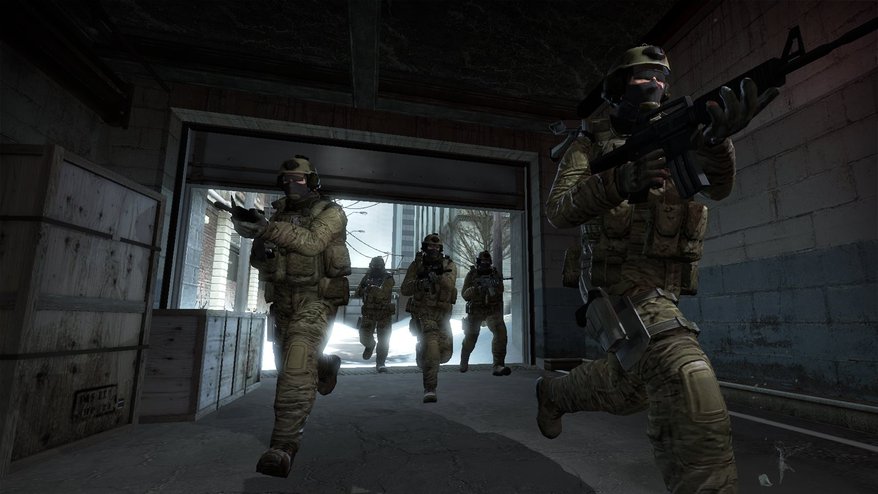
ESL negotiating with Twitch for new exclusive league
ESL negotiating with Twitch for new exclusive league
The ESL [the eSports league] is negotiating a deal with Twitch, Vulcun, and top Counter-Strike: Global Offensive teams to establish a new CS:GO league independent of Valve. What’s particularly interesting (and potentially alarming) about the plan is that according to the Daily Dot, the new league would be exclusive, meaning that teams playing under its auspices would not be allowed to play anywhere else. The ESL, however, says it’s not seeking to prevent teams attending tournaments put on by other organizations.
The plan is being backed by Vulcun, which earlier this week announced that it had raised $12 million in new financing through investors including Sequoia Capital, Universal Music Group, Mark Pincus of Zynga, and other “angel investors.” Sources say the total value of the package offered by ESL and Vulcun runs around $18 million, a “hefty chunk of which” will be paid to teams in exchange for the exclusivity agreement. The deal will also reportedly see exclusive online broadcasting rights granted to Twitch.
The exclusivity angle was challenged by Managing Director of Pro Gaming Ulrich Schuzle, however, who tweeted a link to an ESL post on Reddit shortly after reports of the negotiations came out. “There is only one thing to say about this: ESL is not interested in locking out any tournament organizers from running CS:GO events, nor teams from attending them,” it states.
Full credit to PC Gamer – seen here http://www.pcgamer.com/esl-negotiating-with-twitch-for-new-exclusive-csgo-league/
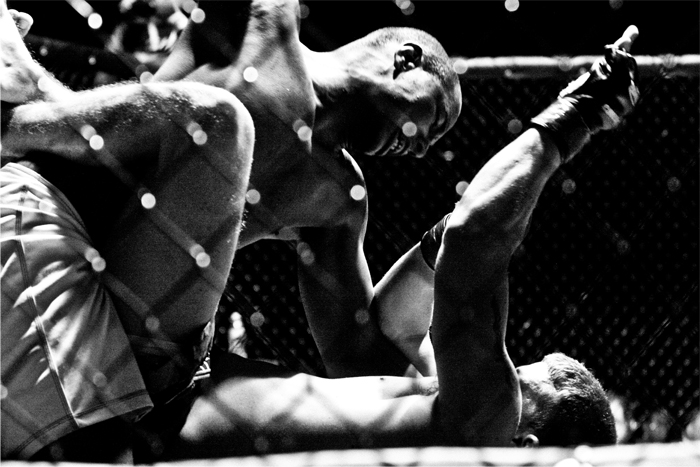
MMA Looks Like It Will Get Its Decision In New York

Daily fantasy pushes to continue growth streak
Daily fantasy pushes to continue growth streak
After more than 60 years in existence, fantasy sports has seen its foundation dramatically altered by a younger sibling.
The family newcomer — daily fantasy — is fun, popular and easy to get along with, and has quickly become a favorite child. But many wonder if the charm of youth will endure. So daily fantasy operators are acting aggressively to ensure that last year’s mainstream arrival was just the beginning.
Few business advancements have had as much effect on an industry as daily fantasy has over the past year, and the early signs of 2015 show no slowdown.
Boston-based DraftKings, one of two major daily fantasy game operators, is actively developing a Series D venture capital round that would exceed $100 million and value the company in the neighborhood of $1 billion, executives there said. A closing is expected sometime this spring.
New York-based FanDuel, DraftKings’ key rival, is said to be mulling a similar major fundraising move, industry sources said. This comes after both companies received significant funding rounds just last summer, worth a collective $111 million, that catapulted them into prominence.
Those prior funding rounds — $70 million for FanDuel and $41 million for Draft-Kings — nearly eclipsed the entire history of venture money in fantasy sports up to that point, and involved major entities such as New York investment bank The Raine Group and NBC Sports Ventures…..

|
| Daily Fantasy sites have poured money into sponsor deals (like FanDuel’s deal with the Magic) and advertising spots. |

|

|

|

|
| Daily fantasy’s quick play and big payouts have drawn a desirable young demographic to the FanDuel (above) and DraftKings sites. |

|
Full credit to Sports Business Journal and Eric Fisher
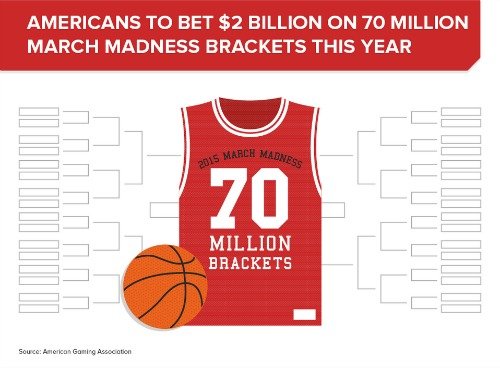
Americans will drop $9 billion betting on March Madness
Americans will drop $9 billion betting on March Madness
March Madness is kicking off, and from your office to the Oval Office, Americans are poised to bet more than ever before on the NCAA men’s basketball championship tournament.
The American Gambling Association, assisted by GfK Custom Research North America, estimates Americans will drop $9 billion betting on the games.
According to the AGA, on average participants will bet on two brackets each at a cost of an average $29 per bracket. Gamblers will wager $2 billion on bracket pools themselves, but many more will likely wager much more on individual games, which is how the American Gambling Association arrives at its $9 billion tally.
NCAA March Madness betting even outdraws the Super Bowl
The $9 billion to be bet on this year’s tournament amounts to more than double what gamblers bet on the Super Bowl, which was closer to $4 billion.
Read more: http://www.businessinsider.com/ncaa-tournament-gambling-projection-2015-3#ixzz3UUmyQrei
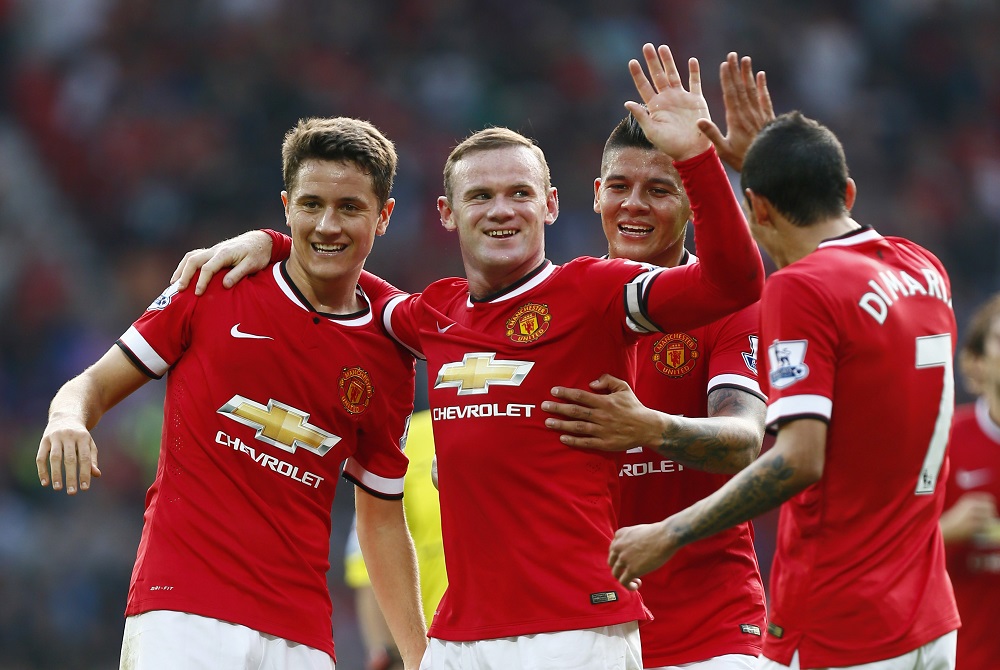
Machester United Launches Branded Casino Games

Machester United Launches Branded Casino Games
A range of social casino games will be launched as part of the partnership, using United branding, including their logo and imagery.
KamaGames is a global developer and publisher of social games for mobile platforms, online, Steam, Xbox Live and PlayStation networks and claim to reach over 70 million users worldwide.
Richard Arnold, United group managing director, commented on the partnership: “Manchester United is lucky enough to have a huge global following and we understand the importance of engaging with and entertaining our fans.
“KamaGames and their innovative products will allow us to do this in new and exciting ways.”
KamaGames CEO, Danny Hammett, added: “KamaGames and Manchester United share a similar worldwide audience and, with this in mind, we are confident that the partnership will be a huge success for both organisations.
“We are proud and honoured to be associated with such a great team and iconic brand, and we look forward to building a strong relationship with the club and its fans.”

Indiana Lawmaker Introduces Sports Betting and DFS Bills
An Indiana legislator, State Representative Alan Morrison (R-Terre-Haute), has introduced two bills for consideration. One would legalize sports betting and the other would legalize Daily Fantasy Sports in the state.
“Gaming is something that this state has become extremely reliant upon, that revenue,” Morrison told the local Indy Star. “As it’s been trending down, it’s incumbent upon us to figure out how to fix it or to improve on what we have.”
The expanded gaming options proposed by Morrison would certainly act as a lifeline for Indiana’s declining gaming industry. However, his proposals will have to compete with more traditional “fixes” that have been talked about, including adding table games to the state’s racinos and moving the riverboat casinos onto dry land.
Sharp revenue decline

Trends In The Casino Industry — A Shift From The Las Vegas Strip To East Asia
The gaming at Las Vegas Strip peaked in 2007 with revenues of $6.83 billion. However, the figure declined to $5.55 billion in 2009. This can be attributed to the economic recession and consequent fall in consumer discretionary spending. The casino industry at the Strip was worst hit by the economic slowdown and it has still been unable to reach the pre-recession levels. Gaming in the region started to rebound since 2010 and the revenues grew to $6.50 billion in 2013. While this has led to a steady revenue growth for casino operators such as Wynn Resorts, Las Vegas Sands and MGM Resorts, the industry is experiencing change. We wonder if the Strip can see any significant growth in the coming years as other states have legalized the casinos, providing gamblers with plenty of alternatives. On the other hand, Macau has seen a rapid growth in gaming over the past few years and we believe it will continue to drive growth for casino operators in the coming years. Also, Japan could offer a big opportunity for the casino operators to expand in East Asia. On that note, we discuss below these three markets from gaming prospective and how is Wynn is expanding its casino operations.
Slower Growth At The Las Vegas Strip Gaming Market
Las Vegas Sands has two propertieson the Strip, The Venetian Las Vegas and The Palazzo. The casinos have a combined gaming space of 225,000 square feet. The casino revenues from these properties have increased from $431 million in 2011 to $584 million in 2013. Wynn Resorts also operates two properties in the region, Wynn Las Vegas Resort and Encore. These properties have 230 table games and 1,854 slot machines in 184,000 square feet of gaming area. The company’s Las Vegas casino revenues have increased from $534 million in 2010 to $683 million in 2013.
Looking at MGM Resorts, it operates 15 owned resorts in the U.S. The company offers more than 22,000 slots and 1,000 gaming tables in the region (excluding the slots and tables in JVs). Like other casino operators, MGM has also seen similar growth over the past few years with revenues increasing from $2.48 billion in 2010 to $2.60 billion in 2013.
However, the growth rate at the Las Vegas Strip has been much lower than the world’s largest gambling hub, Macau, which has seen gaming revenues increasing from $24 billion in 2010 to $44 billion in 2014. Las Vegas Sands and MGM have also seen their Macau casino revenues double over the past few years.
There are various reasons why Las Vegas Strip witnessed a slow growth over the past few years. As disposable income declined during the economic crisis, it hit the Strip harder. Meanwhile, other states legalized casinos, which further weighed over the casinos in Nevada. For instance, Pennsylvania legalized table games like poker and blackjack at casinos in a move to generate higher revenues. Similarly, the Delaware senate also passed a bill to allow table games. This had an adverse effect on the number of tourists visiting Las Vegas for gaming activities and we believe this trend will continue in the coming years. Thus, it does not make much sense for these three casino operators to expand in Nevada and accordingly they are bidding to build casinos in other states.
In September 2014, Wynn won the bid to build a casino resort just outside Boston. The company will build a $1.6 billion resort, which is expected to open in late 2017. Massachusetts Gaming Commission picked Wynn over Mohegan Sun primarily due to better paying jobs and Wynn’s plan to clean up the former industrial land at the development site. This is the third gaming license issued by the MGC. Earlier, it approved MGM’s casino in Springfield, and a Penn National Gaming slots parlor near the Rhode Island border. Wynn plans to develop an integrated casino resort at the 37-acre site on the Mystic River. The resort will comprise of a 500 luxury-room hotel, 140,000 square feet of retail space, eight restaurants, a 12,000 square feet nightclub, a five star spa, 150 table games and 3,000 slot machines.

The 12 Biggest Poker Stories of 2014: #12 Sportify Poker
Poker entrepreneur Alexandre Dreyfus debuted a number of new ideas and initiatives during 2014.
Dreyfus announced the formation of a professional poker league called the Global Poker League and a companion event dubbed the Global Poker Masters where teams of players compete for their country a la the Ryder Cup.
2014 Also saw the expansion of the long-running European Poker Awards, with the announcement of a second award banquet, the aptly named American Poker Awards. Both award ceremonies will be preceded by the inaugural Global Poker Conferences – another Dreyfus creation.
Dreyfus also unveiled a new news website called PokerToday.us and continued to increase the reach of the Global Poker Index, the Hendon Mob, and the company’s Fantasy Poker leagues.
